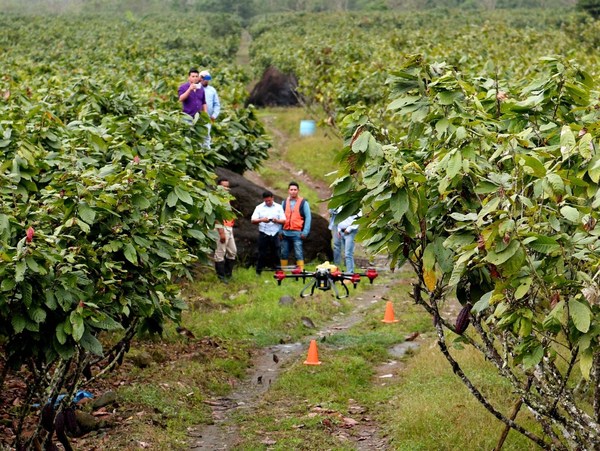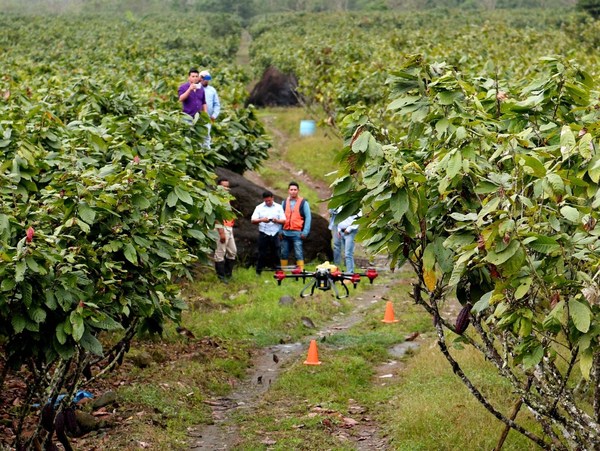GUAYAQUIL, Ecuador, July 13, 2022 /PRNewswire/ — To facilitate sustainable, local cacao production for the finest chocolate, XAG agricultural drone is adopted by cacao growers in Ecuador and provides relief to labour shortage during the busy season.
As more plantations struggle to improve efficiency and remain profitable, farmers are now seeking better solutions to combat plant diseases that can flourish with rainy spells. XAG’s drone technology steps into Ecuador’s cacao gardens to spray timely after rains, protecting cacao fruit from yield loss with trustworthy effect.

XAG agricultural drone conducted pest control in an Ecuadorian cacao farm (Photo credit: Megadrone Ecuador)
More Efficient Spraying Solution in Sloped Farm
As the world’s leading export of cacao, Ecuador is the top spot of high-quality cacao beans, the major ingredient of single-origin chocolates. Small farm owners account for over 90% of the cacao producers. However, the downward trend in cacao prices and the capricious weather have pushed more pressure on preserving yields.
This season, Ecuadorian farmers are opening their arms to embrace drone technology for fruit tree spraying. XAG’s local partner, Megadrone, dispatched an agricultural service team to manage a 180-hectare cacao farm in Guayaquil, the second largest city of Ecuador. Drone was used as an alternative spraying tool to cope with the increasing labour costs.
The cacao farm is located on mountains and the sloped, undulating terrain makes it hard to reach by large ground machinery. Over the previous years, spraying crops and spreading fertilizers were mostly conducted by hired workers manually. It took at least a month to cover the whole fields even with sufficient labour.
Since the drones arrived this April, cacaos can be farmed in a more sustainable practice and become more resilient to climate change. During the operation, the XAG P Series Agricultural Drone was equipped with a full tank of foliar fertilizers and fungicides. It took off from the slope and flew over clusters of bushes to precisely spray on the cacao trees.
Due to the powerful downdraft under propellers, chemical droplets could be easily carried to the whole plant and attach to the leaves uniformly. Two sets of XAG agricultural drones were able to serve the entire 180-hectare cacao fruits in 3 to 4 days.
Keep Cacao Distant from Rain Season Diseases
When the rainy season comes, manual operation is susceptible to the changing climate, and farmers often miss the best time to spray for pest control or disease prevention. In this cacao farm of Guayaquil, the hot, humid weather has last for at least two months, which would accelerate the nutrition loss in plants and increase the risk of infesting diseases.
With the help of drones, now cacao farmers can apply timely fungicide sprays and supply fertilizers to boost growth right after the heavy rains. In addition to aerial spraying, the drone can be fully automated to deal with the complicated landform of cacao trees.
"What’s more, XAG’s agricultural drone can be easily operated by most people. Before launching the drone, the pilot just plans the flight path and sets up parameters on mobile app. This is convenient to learn even for our elderly workers," said by the farm owner.
In the coming three months, the cocoa plantations in Ecuador will enter a vital stage where foliar feeding and insecticide spraying are required for a bumper harvest of cacao pods. With their high agility and efficiency, drones can strongly support cacao farmers to produce fine aromatic cacao beans that the global market adores.



